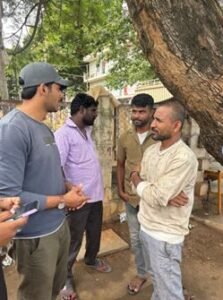A student-led AI initiative showcases how inclusive tech can solve access gaps and indirectly reduce transport burdens in rural Bangalore.
Right in our first week of MBA, #Alliance University plunged us into the deep end of the ocean and asked us to swim!
Of course, it was a deliberate and hands-on challenge: A credit-based Sustainable Development Goals (SDGs) project. Owing to its profound commitment to cultivating purpose-driven leaders from day one, our journey began not with traditional textbooks, but with an immediate plunge into real-world problem-solving.
Momentum Makers, our team, was assigned to solve a pressing issue:
“Healthcare Access in Villages – Mobile Health Clinics for the Interior Villages of the Anekal Taluk.”
From Field Visits to Friction Points

Our first step was to step out of our classrooms and into the community. Upon listening directly to the villagers about the recurring challenge they were facing, we realised the significant gap in accessible and economical healthcare.
Credit to our field coordinators who spoke to them in Kannada and helped us connect with their reality.
While government hospitals were geographically close, they often lacked round-the-clock access to doctors and diagnostic systems. In times of emergency, villagers were forced to turn to private hospitals—spending hours on long-distance travel and high out-of-pocket expenses.
This also highlighted a hidden sustainability angle: The lack of localised access pushes rural communities to rely on costly and polluting transport modes, burdening already scarce public infrastructure.
Discovering the Root Cause
With a week-long deadline and limited resources, we knew we had to narrow it down to a fundamental issue.
The next day, we expanded our outreach. We spoke not only to households, but also to factory workers and daily wage earners.
And bang on: what seemed obscured, suddenly became clear.
Nearly 90% of respondents were unaware of existing government healthcare schemes, particularly ESI, that could have reduced both financial and logistical burdens.
That became our problem statement.
And the solution was waiting to be built.
Mochan – AI for Accessible Health Awareness
Mochan (Sanskrit for “liberation” or “problem-solving”) is an AI-powered mobile application designed to bridge the information and accessibility gap in healthcare.
It serves two critical functions:
- Educating users—especially the digitally uninitiated—about healthcare schemes in simple Kannada.
- Guiding application—helping users determine eligibility and apply through official portals, with step-by-step instructions.

To ensure offline accessibility in low-connectivity areas, we planned to install the application in panchayat offices and other public spaces.
In the long term, we aimed for collaborations with local NGOs, ASHA workers, and accreditation from the state government, creating a community-based distribution model.
Transportation-Sensitive by Design
Our vision for Mochan aligns subtly with the idea of decentralised healthcare access—one that can reduce unnecessary travel to distant hospitals, cutting fuel costs, carbon emissions, and time lost in transport.
In a region where mobility often determines survival, digitally-enabled access can become a low-carbon healthcare enabler.
Learnings from the Field
From breakout room debates to our final jury presentation, this project gave us a crash course in:
- Empathetic design
- Strategic thinking
- Grassroots collaboration
- Tech-for-impact deployment
And more importantly, it showed us that sustainable development is not just about the environment, but also about improving access, inclusion, and equity through thoughtful systems.
Our first week didn’t just teach us to swim.
It taught us how to navigate the currents of change—powered by purpose and propelled by innovation.
Authored by:
Pushpak Sarkar, MBA Student at Alliance University
Arkarag Chaudhuri, Assistant Professor at Alliance University